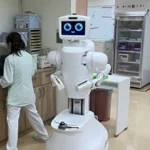Kawasaki Heavy Industries and Foxconn have begun trials of a nursing assistant robot at a Taiwan hospital, betting that automation can address the island’s severe healthcare staffing crisis.
The robot, dubbed “Nurabot,” has been undergoing testing at Taichung Veterans General Hospital since April 2025, with commercial deployment planned for fiscal year 2026. Taiwan faces an estimated shortage of 15,000 to 24,000 nurses this year, according to government data, with burnout driving departures from the profession.
The machine, built on Kawasaki’s existing Nyokkey social robot platform, can transport medical specimens and medications, guide patients through facilities, and deliver basic hygiene education. Foxconn estimates the robot could reduce nursing workloads by up to 30% when deployed for routine tasks.
However, the project represents more than just operational efficiency. Taiwan’s nurse-to-population ratio of 5.7 per 1,000 people falls well below the OECD median of 8.6 nurses per 1,000, creating pressure for technological solutions as the population ages rapidly.
The global medical robotics market, valued at approximately $16 billion in 2024, is projected to grow at 16% annually through 2030. Yet questions remain about whether robotic assistants can meaningfully address complex staffing challenges rooted in workplace conditions and compensation.
The collaboration leverages Kawasaki’s industrial robotics expertise with Foxconn’s software capabilities and NVIDIA’s AI platforms. Taiwan’s hospitals have emerged as testing grounds for smart healthcare technologies, with several facilities adopting AI-powered monitoring systems and digital twin simulations.
For Kawasaki, the venture marks its first medical robotics deployment outside Japan using the Nyokkey platform, which the company has positioned as adaptable across service industries beyond traditional manufacturing applications.





